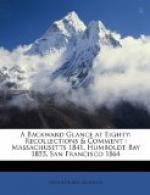[Illustration: Presidential Commission as Registrar of the Land Office at Humboldt, California]
There had been a vacancy for some time, resulting from reduction in the pay from $3000 in gold to $500 in greenbacks, together with commissions, which were few. My father thought it would be good experience for me and advised my acceptance. And so at twenty-two I became a Federal officeholder. The commission from President Lincoln is the most treasured feature of the incident. I learned some valuable lessons. The honor was great and the position was responsible, but I soon felt constrained to resign, to accept a place as quartermaster’s clerk, where I had more pay with more work. I was stationed at Fort Humboldt, where Grant spent a few uncomfortable months in 1854. It was an experience very different from any I had ever had. Army accounting is wholly unlike civilian, books being dispensed with and accounts of all kinds being made in quadruplicate. I shed quantities of red ink and made my monthly papers appear well. I had no responsibility and obeyed orders, but I could not be wholly comfortable when I covered in all the grain that every mule was entitled to when I had judicial knowledge that he had been turned out to grass. Nor could I believe that the full amount of cordwood allowed officers was consumed when fires were infrequent. I was only sure that it was paid for. Aside from these ethical informalities the life was socially agreeable, and there is glamour in the military. My period of service was not very long. My father had settled in San Francisco and the family had joined him. I was lonely, and when my friend, the new Superintendent of Indian Affairs, offered me employment I forsook Fort Humboldt and took up my residence in the city by the Golden Gate.
CHAPTER IV
THE REAL BRET HARTE
Before taking up the events related to my residence in San Francisco I wish to give my testimony concerning Bret Harte, perhaps the most interesting character associated with my sojourn in Humboldt. It was before he was known to fame that I knew him; but I am able to correct some errors that have been made and I believe can contribute to a more just estimate of him as a literary artist and a man.
He has been misjudged as to character. He was a remarkable personality, who interpreted an era of unusual interest, vital and picturesque, with a result unparalleled in literary annals. When he died in England in 1902 the English papers paid him very high tribute. The London Spectator said of him: “No writer of the present day has struck so powerful and original a note as he has sounded.” This is a very unusual acknowledgment from a source not given to the superlative, and fills us with wonder as to what manner of man and what sort of training had led to it.
Causes are not easily determined, but they exist and function. Accidents rarely if ever happen. Heredity and experience very largely account for results. What is their testimony in this particular case?




